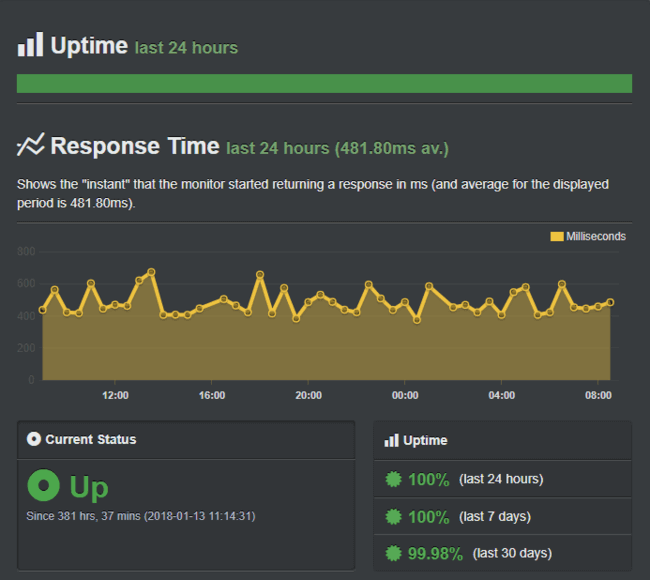In today’s digital age, websites serve as the primary interface for businesses to engage with their customers. However, even the most well-designed websites are susceptible to occasional downtime, which can lead to lost revenue, damaged reputation, and dissatisfied users. To mitigate these risks, website uptime monitoring plays a crucial role. In this article, we will explore the importance of website uptime monitoring and how it can help prevent downtime. We will also touch upon the benefits of hiring a QA tester and the expertise of JayDevs in this field.
The Impact of Downtime:
Downtime refers to any period when a website or online service is inaccessible or experiences performance issues. The consequences of downtime can be severe for businesses. Studies have shown that even a few minutes of downtime can result in significant revenue loss. Customers may choose to abandon a website if it is unavailable or experiencing delays, leading to a decline in sales and potential damage to the brand’s reputation.
Importance of Website Uptime Monitoring:

- Website uptime monitoring involves the continuous tracking of a website’s availability and performance. Here’s why it is crucial:
- Early Detection of Issues: Uptime monitoring tools can detect potential issues and notify website owners or administrators before they escalate into major problems. This allows for prompt action to be taken to resolve the issues and prevent extended downtime.
- Minimize Revenue Loss: By ensuring the continuous availability of your website, uptime monitoring helps prevent revenue loss due to downtime. It enables businesses to identify patterns or trends that may lead to downtime and take preventive measures accordingly.
- Enhance User Experience: Consistent website uptime is essential for providing a seamless user experience. By monitoring uptime, businesses can identify performance bottlenecks, optimize website speed, and improve overall user satisfaction.
- Maintain SEO Rankings: Search engines consider website availability as a ranking factor. A website experiencing frequent downtime can negatively impact its search engine rankings. Uptime monitoring helps ensure that your website remains accessible to search engines and maintains its position in search results.
- Proactive Issue Resolution: Website uptime monitoring allows businesses to proactively identify and resolve issues before they impact the website’s performance. By receiving real-time alerts and notifications, businesses can address potential problems promptly, minimizing the risk of extended downtime. This proactive approach ensures that customers can access the website without interruption, fostering trust and loyalty.
- Data-Driven Decision Making: Uptime monitoring provides valuable data and insights into website performance, response times, and downtime incidents. By analyzing this data, businesses can make informed decisions to optimize their website’s infrastructure, identify areas for improvement, and allocate resources effectively. Data-driven decision making helps businesses enhance their overall website performance and minimize the likelihood of downtime in the future.
Benefits of Hiring a QA Tester
A QA (Quality Assurance) tester plays a crucial role in ensuring the quality and reliability of a website. Here are some benefits of hire QA tester:
- Comprehensive Testing: QA testers perform rigorous testing across various devices, browsers, and operating systems to identify potential issues that may lead to downtime. They conduct functional, usability, performance, and security testing to ensure that the website functions optimally.
- Early Bug Detection: QA testers can identify bugs and vulnerabilities in the early stages of development. By addressing these issues proactively, they prevent potential downtime and ensure a smooth user experience.
- User-Centric Approach: QA testers focus on understanding the needs and expectations of users. They conduct user acceptance testing and provide valuable feedback to improve the website’s usability, accessibility, and overall user experience.
- Continuous Monitoring: QA testers can implement automated testing and monitoring tools to ensure ongoing quality assurance. This helps identify any deviations from the expected performance and promptly address them, preventing downtime.
Expertise of JayDevs
When it comes to website uptime monitoring and QA testing, JayDevs is a renowned name in the industry. With their expertise and experience, they offer comprehensive solutions to prevent downtime and ensure website reliability.
JayDevs employs a team of skilled QA testers who specialize in identifying potential issues that may lead to downtime. They provide continuous monitoring, testing, and optimization services to maintain a high level of uptime and user satisfaction. Their commitment to quality assurance and their in-depth knowledge of industry best practices make them an ideal partner for businesses seeking to minimize downtime and maximize website performance.
Conclusion
Website uptime monitoring is essential for businesses to prevent downtime and maintain a seamless user experience. Downtime can have detrimental effects, including revenue loss, reputation damage, and customer dissatisfaction. By implementing website uptime monitoring strategies and hiring a skilled QA tester like JayDevs, businesses can mitigate these risks. QA testers bring expertise in comprehensive testing, bug detection, and continuous monitoring, ensuring potential issues are addressed early on. JayDevs offers tailored solutions, conducting rigorous testing across various devices and platforms using automated tools. By investing in website uptime monitoring and QA testing, businesses can improve reliability, uninterrupted availability, and deliver an exceptional user experience, safeguarding their reputation and customer trust.



